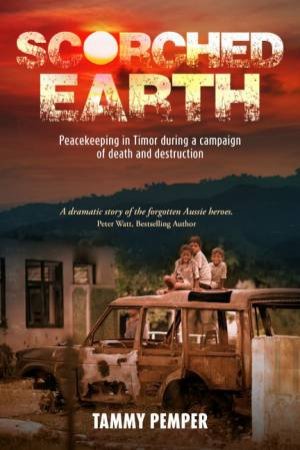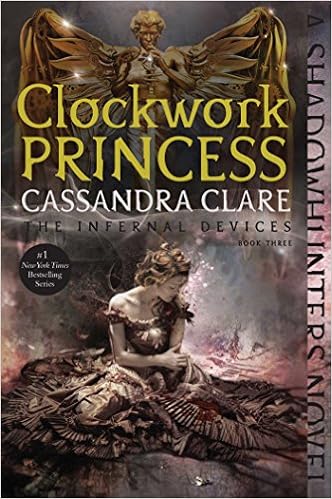 The writer ranges in subjects from friends long-dead to the pleasure of drinking tea, watching a sunset, or smelling your child’s hair. As Dougherty touches on these many subjects and themes, one is taken in by the compassion in his approach.
The writer ranges in subjects from friends long-dead to the pleasure of drinking tea, watching a sunset, or smelling your child’s hair. As Dougherty touches on these many subjects and themes, one is taken in by the compassion in his approach.
A review of Scorched Earth by Tammy Pemper
 Pemper has an impressive command of language, a necessary skill for creating a sense of place in what could easily be a generic theatre of war. In a perfect analogy for the social upheaval, the wheels of Peter’s truck are seen brushing the edge of the abyss at a cliffs edge during the journey. The remnants of a destructive landslide hinder the way forward on the road they travel. Woven into the background details is this lingering sense of danger and disturbance. It feels precarious.
Pemper has an impressive command of language, a necessary skill for creating a sense of place in what could easily be a generic theatre of war. In a perfect analogy for the social upheaval, the wheels of Peter’s truck are seen brushing the edge of the abyss at a cliffs edge during the journey. The remnants of a destructive landslide hinder the way forward on the road they travel. Woven into the background details is this lingering sense of danger and disturbance. It feels precarious.
A review of Not What You Think by Clark Gormley
 For anyone who thinks poetry needs to be experimental, difficult, overly-complex, or high-blown, Not What You Think is the antidote. Gormley’s poetry book is a pleasure to read and even more of a pleasure to read aloud. If you’re able to catch Gormley performing his work, that’s the ideal, as these are poems that are not only able to be sung, but work perfectly accompanied by acoustic guitar and a wry vernacular, but they also work beautifully on the page.
For anyone who thinks poetry needs to be experimental, difficult, overly-complex, or high-blown, Not What You Think is the antidote. Gormley’s poetry book is a pleasure to read and even more of a pleasure to read aloud. If you’re able to catch Gormley performing his work, that’s the ideal, as these are poems that are not only able to be sung, but work perfectly accompanied by acoustic guitar and a wry vernacular, but they also work beautifully on the page.
An Interview with Kristina Marie Darling
 Literary critic, agent, teacher, and author Kristina Marie Darling talks about her many creative hats, her latest collection of poems Dark Horse, her influences, on the nature of time in poetry, her latest work of literary criticism, Real Je Suit L’Autr, Tupelo Press, advice for writers, and lots more.
Literary critic, agent, teacher, and author Kristina Marie Darling talks about her many creative hats, her latest collection of poems Dark Horse, her influences, on the nature of time in poetry, her latest work of literary criticism, Real Je Suit L’Autr, Tupelo Press, advice for writers, and lots more.
A review of Clockwork Princess by Cassandra Clare
 The relationship, particularly those between our main characters – Will, Tessa and Jem – strengthens and grows even more through the course of Clockwork Princess, with the conclusion of this book to be one of the best I’ve read. The final scenes and chapters of this book were truly astonishing and absolutely wonderful.
The relationship, particularly those between our main characters – Will, Tessa and Jem – strengthens and grows even more through the course of Clockwork Princess, with the conclusion of this book to be one of the best I’ve read. The final scenes and chapters of this book were truly astonishing and absolutely wonderful.
A review of Stanley Park by Sapphira Olson
 I like to say that Stanley Park kept me reading with enthusiasm and intrigue, not only because of the pristine imagery, the hint of mythology and fantasy, the veiled politics, the sad and happy remembrances, but also because I, being such a romantic, I wanted to know if the two women, like the cliché says: lived happy ever after Stanley Park is a book about love a book to be loved.
I like to say that Stanley Park kept me reading with enthusiasm and intrigue, not only because of the pristine imagery, the hint of mythology and fantasy, the veiled politics, the sad and happy remembrances, but also because I, being such a romantic, I wanted to know if the two women, like the cliché says: lived happy ever after Stanley Park is a book about love a book to be loved.
A review of Praise Song For My Children by Patricia Jabbeh Wesley
 This book of poetry is part of Wesley’s mission to bear witness to the pain in her homeland. With her family’s good fortune to live in America, she writes of children in the poem, “This Is The Real Leaving,” that “They may never know / why I’m angry that there’s food in my fridge // while others starve.”
This book of poetry is part of Wesley’s mission to bear witness to the pain in her homeland. With her family’s good fortune to live in America, she writes of children in the poem, “This Is The Real Leaving,” that “They may never know / why I’m angry that there’s food in my fridge // while others starve.”
A review of Flowers, all sorts in blossom, figs, berries, and fruits forgotten by Oisín Breen
 The 95 page book contains only three poems, but they are grand, long, and epic, taking up space and working across time. Each of the poems relates to one another and are connected through the act described in the title of the first poem:“Isn’t the act of placing flowers on a tomb a gesture of bringing a little life back to the dead?” Taken collectively, the work is an elegy; a meditation on death and time, inheritance and love.
The 95 page book contains only three poems, but they are grand, long, and epic, taking up space and working across time. Each of the poems relates to one another and are connected through the act described in the title of the first poem:“Isn’t the act of placing flowers on a tomb a gesture of bringing a little life back to the dead?” Taken collectively, the work is an elegy; a meditation on death and time, inheritance and love.
An interview with Michael Foldes
 The Founder and Editor-in-Chief of Ragazine talks about his magazine, his social and political work, his own poetry, the most popular column in Ragazine, how the magazine survives (or not) without fees, and lots more.
The Founder and Editor-in-Chief of Ragazine talks about his magazine, his social and political work, his own poetry, the most popular column in Ragazine, how the magazine survives (or not) without fees, and lots more.
A review of Below Deck by Sophie Hardcastle
 Oli’s rebirth is rooted in connection, where she feels herself a part of the ocean; a part of the Earth, and connected to the other women with her. It’s an antidote to violence and the kind of toxic masculinity that is destroying our species. Below Deck is a rich, powerful, and wonderful novel full of exquisite writing, important themes, and powerfully realised textures.
Oli’s rebirth is rooted in connection, where she feels herself a part of the ocean; a part of the Earth, and connected to the other women with her. It’s an antidote to violence and the kind of toxic masculinity that is destroying our species. Below Deck is a rich, powerful, and wonderful novel full of exquisite writing, important themes, and powerfully realised textures.